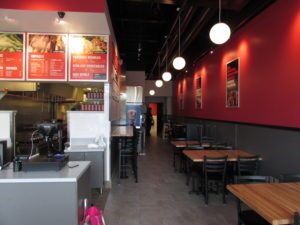Creating Some Madness
 Some Potbelly locations acknowledge the local terrain in custom murals. Photos courtesy of Potbelly Sandwich ShopTeriyaki Madness is a fast-casual restaurant concept that’s committed to breaking free of the homogenization of franchising.
Some Potbelly locations acknowledge the local terrain in custom murals. Photos courtesy of Potbelly Sandwich ShopTeriyaki Madness is a fast-casual restaurant concept that’s committed to breaking free of the homogenization of franchising.
The Denver-based chain has 39 stores open and 117 in development — and it wants each to be unique.
“We’re looking for individuality in each shop,” says CEO Michael Haith. “We want each one to reflect the personality of the franchisee and the market they are in. We want them to celebrate their individuality and be proud of their shop.”
To stay true to the chain’s name, Haith encourages each franchisee “to put a little madness in there,” he says. “This creates the personality of a store, and frankly, owners enjoy and take more pride and ownership when the stores are designed partly by them.” The Las Vegas store, for example, is decorated with local sports pennants and posters, including an AC/DC poster; the Lewisville, Texas, location shows the movie “Godzilla” on a permanent loop.
One constant — although it varies from store to store — is a Wall of Chatter, which features an enlarged quote chosen by the franchisee. “The quote has to be something that identifies with them as a person and their business,” Haith says.
There are few rules for the restaurants. “We are not hung up on the furniture or the type of floor or the lighting or the type of ceiling. We do insist on our color scheme and brand book, which identifies our brand voice, personality, vision, values and defines who we are and who we are not,” Haith explains. However, he adds, “we want a feeling of community where we support the community and the community supports us.”
An advantage of doing things this way, Haith adds, is that retrofits can be completed for much less money since existing designs and furniture — and anything else — can be used.
Of course, Haith says, this is much harder than using a cookie-cutter format since each restaurant begins from scratch. However, the payoff is worth it. “It allows us to compete with local restaurants, and it provides more ownership of the shops by the franchisees,” he explains.
The stores are very diverse. One may feature an industrial look with concrete floors and ductwork showing; another may look like a couple bought the store space and turned it into a little owner-operated restaurant.
“Not having that scripted decor makes a more comfortable environment,” Haith says. “There’s some warmth in each one because there’s been love and attention poured into it. It’s very hard for a franchise owner to pour their heart and soul into a fluorescent-lit box versus something warm that they feel good about. If there isn’t that soul, there’s nothing for the community to latch on to. It’s about connection. We want the community to want to support this restaurant.”






